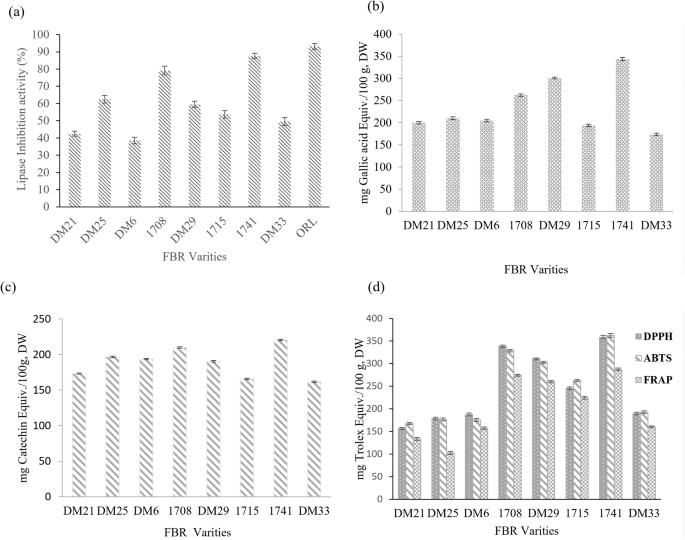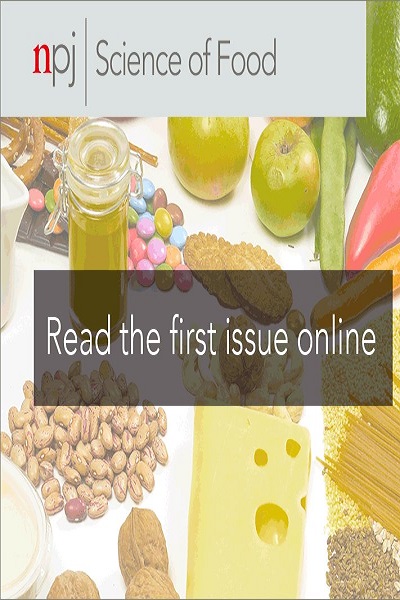Untargeted metabolomics-based network pharmacology reveals fermented brown rice towards anti-obesity efficacy
IF 6.3
1区 农林科学
Q1 FOOD SCIENCE & TECHNOLOGY
引用次数: 0
Abstract
There is a substantial rise in the global incidence of obesity. Brown rice contains metabolic substances that can help minimize the prevalence of obesity. This study evaluated nine brown rice varieties using probiotic fermentation using Pediococcus acidilacti MNL5 to enhance bioactive metabolites and their efficacy. Among the nine varieties, FBR-1741 had the highest pancreatic lipase inhibitory efficacy (87.6 ± 1.51%), DPPH assay (358.5 ± 2.80 mg Trolox equiv./100 g, DW), and ABTS assay (362.5 ± 2.32 mg Trolox equiv./100 g, DW). Compared to other fermented brown rice and FBR-1741 varieties, UHPLC-Q-TOF-MS/MS demonstrated significant untargeted metabolite alterations. The 17 most abundant polyphenolic metabolites in the FBR-1741 variety and 132 putative targets were assessed for obesity-related target proteins, and protein interaction networks were constructed using the Cystoscope software. Network pharmacology analysis validated FBR-1741 with active metabolites in the C. elegans obesity-induced model. Administration of FBR-1741 with ferulic acid improved lifespan decreased triglycerides, and suppressed the expression of fat-related genes. The enhanced anti-obesity properties of FBR-1741 suggest its implementation in obesity-functional food.

基于非靶向代谢组学的网络药理学揭示了发酵糙米的抗肥胖功效。
全球肥胖症发病率大幅上升。糙米中含有的代谢物质有助于最大限度地降低肥胖症的发病率。本研究评估了九个糙米品种,通过使用酸乳乳酸钠钙球菌(Pediococcus acidilacti MNL5)进行益生菌发酵来提高生物活性代谢物及其功效。在这九个品种中,FBR-1741 的胰脂肪酶抑制效力(87.6 ± 1.51%)、DPPH 检测(358.5 ± 2.80 毫克三环氧化酶当量/100 克,DW)和 ABTS 检测(362.5 ± 2.32 毫克三环氧化酶当量/100 克,DW)最高。与其他发酵糙米和 FBR-1741 品种相比,UHPLC-Q-TOF-MS/MS 显示出显著的非目标代谢物变化。对 FBR-1741 品种中含量最高的 17 种多酚代谢物和 132 个推测靶标进行了肥胖相关靶蛋白评估,并使用 Cystoscope 软件构建了蛋白质相互作用网络。网络药理学分析验证了 FBR-1741 与活性代谢物在秀丽隐杆线虫肥胖诱导模型中的作用。与阿魏酸一起服用 FBR-1741 可改善寿命,降低甘油三酯,并抑制脂肪相关基因的表达。FBR-1741 抗肥胖特性的增强表明它可用于肥胖功能食品。
本文章由计算机程序翻译,如有差异,请以英文原文为准。
求助全文
约1分钟内获得全文
求助全文
来源期刊

NPJ Science of Food
FOOD SCIENCE & TECHNOLOGY-
CiteScore
7.50
自引率
1.60%
发文量
53
期刊介绍:
npj Science of Food is an online-only and open access journal publishes high-quality, high-impact papers related to food safety, security, integrated production, processing and packaging, the changes and interactions of food components, and the influence on health and wellness properties of food. The journal will support fundamental studies that advance the science of food beyond the classic focus on processing, thereby addressing basic inquiries around food from the public and industry. It will also support research that might result in innovation of technologies and products that are public-friendly while promoting the United Nations sustainable development goals.
 求助内容:
求助内容: 应助结果提醒方式:
应助结果提醒方式:


